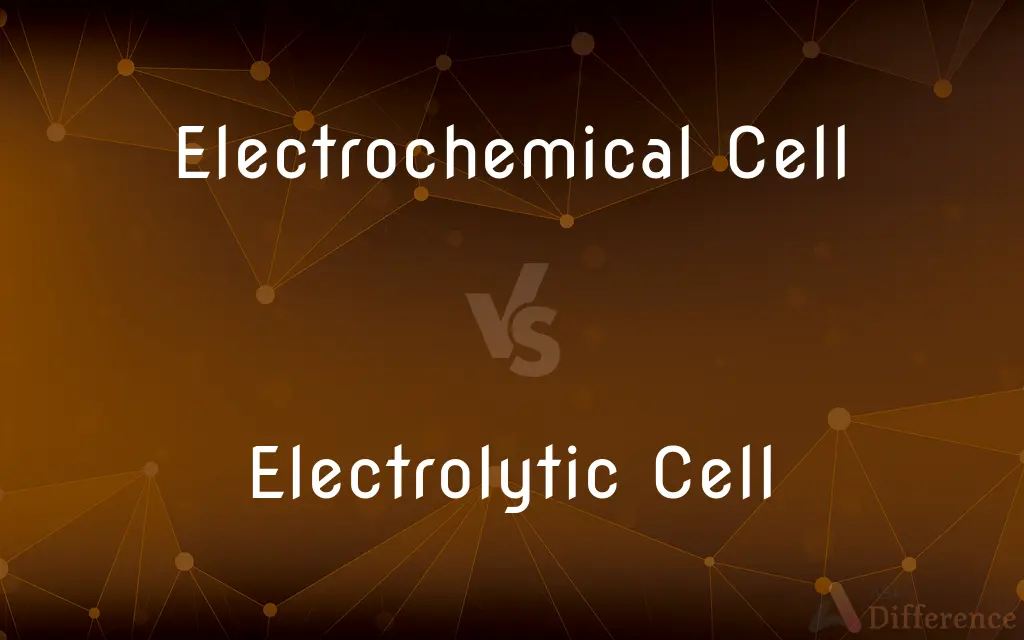Electrochemical Cell vs. Electrolytic Cell — What's the Difference?
By Tayyaba Rehman — Published on December 3, 2023
An Electrochemical Cell generates electricity from chemical reactions. An Electrolytic Cell uses electricity to drive a non-spontaneous chemical reaction.

Difference Between Electrochemical Cell and Electrolytic Cell
Table of Contents
ADVERTISEMENT
Key Differences
An Electrochemical Cell is a device that transforms the energy from spontaneous chemical reactions into electrical energy. Conversely, an Electrolytic Cell uses external electrical energy to drive a non-spontaneous chemical reaction.
In an Electrochemical Cell, the chemical reaction naturally wants to occur and results in the production of electricity. In contrast, an Electrolytic Cell requires an external source of electricity to push the reaction forward.
Common examples of Electrochemical Cells include batteries and fuel cells, where spontaneous chemical reactions generate electricity. For Electrolytic Cells, electroplating and the electrolysis of water to produce hydrogen and oxygen are typical examples.
Another key distinction is that in an Electrochemical Cell, the anode is the site of oxidation and is negative. In an Electrolytic Cell, the anode is still the site of oxidation but is positive.
Ultimately, while both Electrochemical and Electrolytic Cells involve the movement of electrons and ions to facilitate chemical reactions, their primary functions differ: Electrochemical Cells produce electrical energy, whereas Electrolytic Cells consume it.
ADVERTISEMENT
Comparison Chart
Primary Function
Generates electrical energy.
Consumes electrical energy.
Reaction Type
Spontaneous.
Non-spontaneous.
Common Examples
Batteries, fuel cells.
Electroplating, electrolysis of water.
Electrical Source Requirement
No external source needed.
Requires external electricity.
Anode Characteristics
Oxidation, negative.
Oxidation, positive.
Compare with Definitions
Electrochemical Cell
A setup comprising two electrodes facilitating redox reactions.
In an Electrochemical Cell, the oxidation half-reaction occurs at the anode.
Electrolytic Cell
A system using electrical energy to drive a non-spontaneous chemical reaction.
The Electrolytic Cell is used in the extraction of aluminum from its ore.
Electrochemical Cell
A system converting chemical energy into electrical energy.
Batteries in flashlights use an Electrochemical Cell to provide power.
Electrolytic Cell
A cell consuming electrical energy to achieve chemical transformations.
An Electrolytic Cell is essential for many industrial chemical processes.
Electrochemical Cell
A device where spontaneous reactions produce electricity.
A zinc-copper Electrochemical Cell can light up a bulb.
Electrolytic Cell
An apparatus that utilizes external power to produce desired chemical products.
The purification of copper is often done using an Electrolytic Cell.
Electrochemical Cell
A cell that harnesses chemical reactions to generate a voltage.
Many portable electronics rely on the Electrochemical Cell for energy.
Electrolytic Cell
A device where external electricity forces a chemical change.
Electroplating is achieved using an Electrolytic Cell.
Electrochemical Cell
An apparatus that transforms chemical potential into electrical work.
An Electrochemical Cell functions as the heart of many renewable energy storage systems.
Electrolytic Cell
A setup that facilitates forced redox reactions through applied voltage.
In an Electrolytic Cell, water can be split into hydrogen and oxygen.
Common Curiosities
For what industrial process is an Electrolytic Cell often used?
Electrolytic Cells are frequently used for electroplating and extracting metals like aluminum.
What's the primary purpose of an Electrochemical Cell?
An Electrochemical Cell's main purpose is to convert chemical energy into electrical energy.
Do Electrochemical Cells require an external electrical source?
No, Electrochemical Cells produce electricity from spontaneous chemical reactions.
Which cell is used in the production of hydrogen gas?
Hydrogen gas production by water electrolysis uses an Electrolytic Cell.
Can a cell be both electrochemical and electrolytic?
Yes, in reversible systems, the same cell can function as both, depending on the conditions.
How does an Electrolytic Cell function?
An Electrolytic Cell uses external electricity to drive a non-spontaneous chemical reaction.
Are batteries considered Electrochemical Cells?
Yes, batteries are common examples of Electrochemical Cells.
Can an Electrochemical Cell recharge?
Yes, rechargeable batteries use reversible Electrochemical Cells.
Why are Electrolytic Cells essential in metal purification?
Electrolytic Cells help in the deposition of pure metal from impure metal solutions.
Which cell type is vital for renewable energy storage?
Electrochemical Cells are crucial for renewable energy storage, as seen in rechargeable batteries.
How is the anode characterized in an Electrolytic Cell?
In an Electrolytic Cell, the anode is positive and undergoes oxidation.
What kind of reactions occur in Electrochemical Cells?
Spontaneous redox reactions occur in Electrochemical Cells.
Are fuel cells a type of Electrochemical Cell?
Yes, fuel cells are a type of Electrochemical Cell that converts the energy from a chemical reaction into electricity.
What drives the reactions in an Electrolytic Cell?
External electrical energy drives the reactions in an Electrolytic Cell.
What is the outcome when electricity is passed through saltwater in an Electrolytic Cell?
In an Electrolytic Cell, passing electricity through saltwater produces chlorine gas at the anode and hydrogen gas at the cathode.
Share Your Discovery

Previous Comparison
Beats Solo 2 vs. Beats Solo 3
Next Comparison
Mutually Exclusive Events vs. Independent EventsAuthor Spotlight
Written by
Tayyaba RehmanTayyaba Rehman is a distinguished writer, currently serving as a primary contributor to askdifference.com. As a researcher in semantics and etymology, Tayyaba's passion for the complexity of languages and their distinctions has found a perfect home on the platform. Tayyaba delves into the intricacies of language, distinguishing between commonly confused words and phrases, thereby providing clarity for readers worldwide.
















































